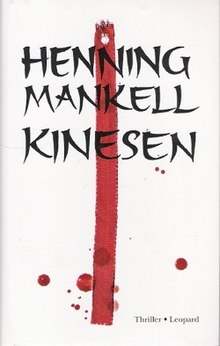The Man from Beijing
 First edition | |
| Author | Henning Mankell |
|---|---|
| Original title | Kinesen |
| Translator | Laurie Thompson |
| Language | Swedish, English translation |
| Genre | Crime novel |
| Publisher | Leopard Förlag (Sweden) Harvill Secker (UK) Alfred A. Knopf (USA) |
Publication date | 20 May 2008 (Sweden) 10 January 2010 (UK) 16 February 2010 (USA) |
| Publication place | Sweden |
| Media type | Print (hardcover, paperback) E-book |
| ISBN | 1-84655-257-5 |
The Man from Beijing is a novel by Swedish writer Henning Mankell first published in Swedish on 20 May 2008 under the title Kinesen (The Chinese). The English translation by Laurie Thompson was published in the UK on 10 January 2010, and in the US on 16 February 2010.[1]
Plot
In January 2006 the police make the gruesome discovery of the bodies of 19 people who have been brutally murdered in the remote hamlet of Hesjövallen in northern Sweden. The protagonist Birgitta Roslin, a district judge from Helsingborg, realises she has a family connection with some of the victims. Roslin's curiosity is raised by clues found at the scene and leads her to unofficially investigate the massacre. The narrative also chronicles the lives of several characters living during the mid-19th century in China and the United States, whose experiences are somehow also connected to the mass killings. As the plot unfolds, extending across four continents, Roslin unintentionally becomes embroiled in a web of international corruption and political intrigue.[2]
Reception
The Man from Beijing was generally well-received. In Bookmarks May/June 2010 issue, a magazine that aggregates critic reviews of books, the book received a ![]()
![]()
![]()
![]()
![]() (3.5 out of 5) with the summary stating, "Critics generally agree that Mankell's stand-alone thriller--a combination of police procedural and geopolitical novel--lives up to the best of the Kurt Wallander series".[3]
(3.5 out of 5) with the summary stating, "Critics generally agree that Mankell's stand-alone thriller--a combination of police procedural and geopolitical novel--lives up to the best of the Kurt Wallander series".[3]
Adaptations
Yellow Bird acquired the TV film rights and produced a German language version together with Austrian production company Lotus Film and broadcasters ARD and ORF.[4] It was broadcast in Austria by ORF on 30 December 2011, following DVD releases in Germany and France a few days earlier.[5] The film was nominated for two German Camera Awards: to Alexander Fischerkoesen for Best Cinematography of a TV Film[6] and to Moune Barius for Best Editing of a TV Film.[7]
See also
References
- ^ Inspector-Wallander.org: The Man from Beijing Linked 2015-02-05
- ^ Random House: The Man from Beijing Linked 2015-02-05
- ^ "The Man From Beijing By Henning Mankell". Bookmarks Magazine. Archived from the original on 5 Sep 2015. Retrieved 14 January 2023.
- ^ IMDb: The Man from Beijing - Company Credits Linked 2015-02-05
- ^ MDb: The Man from Beijing - Release Info Linked 2015-02-05
- ^ Deutscher Kamerapreis 2012: Nominerungen Kamera, Kategorie Fernsehfilm, Alexander Fischerkoesen für “Der Chinese” Linked 2015-02-05
- ^ Deutscher Kamerapreis 2012: Nominerungen Schnitt, Kategorie Fernsehfilm, Moune Barius für “Der Chinese” Linked 2015-02-05
